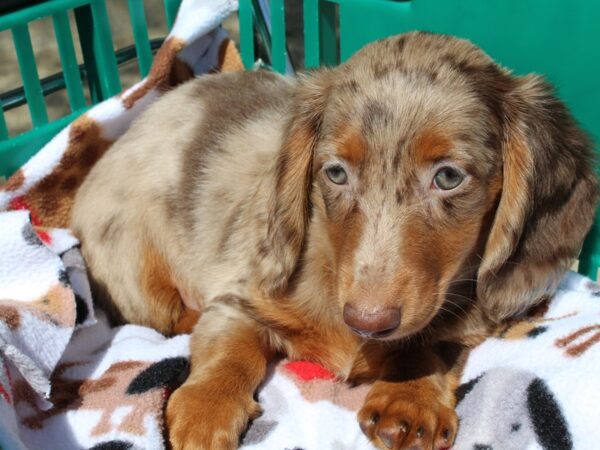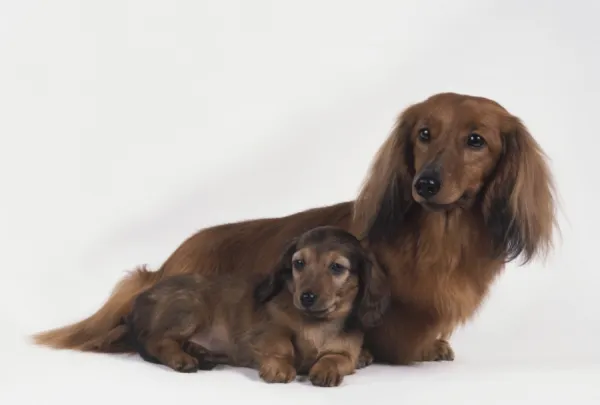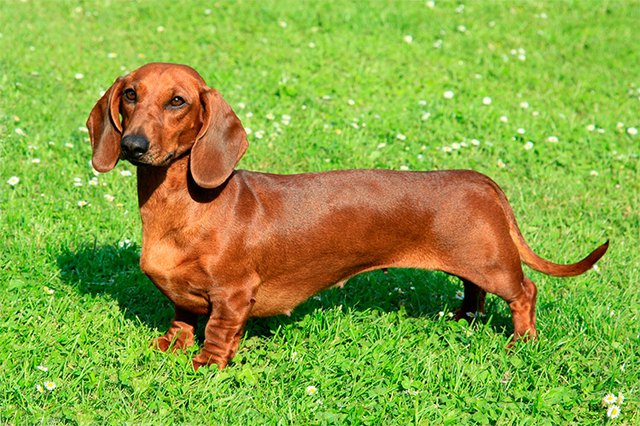The dachshund, also known as the sausage dog or wiener dog, is a popular breed of dog that is known for its long, slender body and short legs. While dachshunds come in a variety of colors and coat lengths, the female dachshund is often considered to be the more independent and stubborn of the sexes. However, this does not mean that she is not a loving and affectionate companion. In fact, the female dachshund can make a wonderful pet for the right family.
SEEMORE: Why Dachshunds Are The Worst Breed?
Contents
Physical Characteristics

Female dachshunds typically weigh between 16 and 25 pounds and stand 8 to 9 inches tall at the shoulder. They have a long, muscular body with a broad chest and a deep rib cage. Their legs are short and sturdy, and their feet are large and padded. The dachshund’s tail is long and bushy, and it is often carried high. The dachshund’s coat can be smooth, long, or wirehaired.
Coat Types
There are three main types of coats for dachshunds: smooth, long, and wirehaired. Each type has its own unique characteristics and requires different levels of grooming.
Smooth-Coated Dachshunds
Smooth-coated dachshunds have a short, sleek coat that is easy to care for. They have a dense undercoat and a smooth topcoat, which gives them a shiny appearance. This type of coat sheds moderately and only requires occasional brushing to remove loose hair. Smooth-coated dachshunds also have a distinctive “beard” on their chin, adding to their charming appearance.
Long-Haired Dachshunds
Long-haired dachshunds have a longer, flowing coat that requires more frequent brushing. They have a soft undercoat and a longer, silky topcoat that can come in a variety of colors and patterns. This type of coat sheds more than the smooth-coated dachshund and may require daily brushing to prevent matting and tangles.
Wirehaired Dachshunds
Wirehaired dachshunds have a rough, wiry coat that is weather-resistant. They have a dense undercoat and a wiry topcoat that gives them a scruffy appearance. This type of coat sheds the least out of the three types and requires occasional grooming to maintain its shape. Wirehaired dachshunds also have distinctive eyebrows and a beard, adding to their unique look.
Temperament and Personality

The female dachshund is typically an independent and stubborn dog. She is also very intelligent and curious. Dachshunds are known for their love of digging, and they can be quite destructive if they are not given enough exercise. They are also very vocal dogs, and they will often bark at strangers or other animals.
Independent and Stubborn
Female dachshunds are known for their independence and stubbornness. They are not always eager to please and may have a mind of their own. This can make training a challenge, but with patience and consistency, they can learn to follow commands and be well-behaved companions.
Intelligent and Curious
Dachshunds are highly intelligent dogs and love to explore their surroundings. They are curious by nature and will often investigate anything that catches their attention. This makes them great problem-solvers and can lead to some mischievous behavior if they are not given enough mental stimulation.
Love of Digging
One of the most well-known traits of dachshunds is their love of digging. This behavior stems from their history as hunting dogs, where they were used to dig into burrows and flush out prey. While this instinct may still be present in some dachshunds, it can also be a sign of boredom or lack of exercise. Providing your dachshund with appropriate outlets for their digging behavior, such as a designated digging area or interactive toys, can help prevent destructive digging.
Health Concerns

Like all breeds, dachshunds are prone to certain health issues. It is important for potential owners to be aware of these concerns and take proper precautions to ensure the health and well-being of their dachshund.
Intervertebral Disc Disease (IVDD)
One of the most common health concerns for dachshunds is IVDD, which is a condition that affects the spinal discs. Due to their long bodies and short legs, dachshunds are more susceptible to this condition, which can cause pain, paralysis, and even death. Proper weight management and avoiding activities that put strain on the spine, such as jumping on and off furniture, can help prevent IVDD.
Obesity
Dachshunds are prone to obesity, which can lead to a variety of health issues such as joint problems, diabetes, and heart disease. It is important to monitor your dachshund’s diet and exercise to prevent them from becoming overweight. Regular walks and playtime, along with a balanced diet, can help keep your dachshund at a healthy weight.
Dental Problems
Due to their small size and crowded teeth, dachshunds are prone to dental problems such as tartar buildup and tooth decay. It is important to establish a regular dental care routine for your dachshund, including brushing their teeth and providing dental chews or treats.
Training and Exercise

As mentioned earlier, dachshunds can be stubborn and independent, which can make training a challenge. However, with patience and consistency, they can learn to follow commands and be well-behaved companions.
Obedience Training
Obedience training is important for any dog, and dachshunds are no exception. It is important to start training your dachshund at a young age and use positive reinforcement techniques. Consistency is key with dachshunds, as they can easily become bored or distracted during training sessions.
Socialization
Dachshunds can be wary of strangers and other animals, so it is important to socialize them from a young age. This includes exposing them to different people, animals, and environments in a controlled and positive manner. Proper socialization can help prevent fear-based aggression and make your dachshund more comfortable in new situations.
Exercise Needs
While dachshunds may have short legs, they still require regular exercise to maintain their physical and mental well-being. Daily walks and playtime are important for keeping them physically fit and preventing boredom and destructive behavior. However, it is important to avoid activities that put strain on their long bodies, such as jumping or running up and down stairs.
Grooming Needs

The grooming needs of a dachshund will vary depending on their coat type. Smooth-coated dachshunds require the least amount of grooming, while long-haired and wirehaired dachshunds will require more maintenance.
Brushing
Smooth-coated dachshunds only require occasional brushing to remove loose hair and keep their coat shiny. Long-haired dachshunds will need daily brushing to prevent matting and tangles. Wirehaired dachshunds should be brushed at least once a week to maintain their rough coat.
Bathing
Dachshunds do not require frequent bathing unless they get particularly dirty or smelly. Over-bathing can strip their coat of its natural oils and cause skin irritation. When bathing your dachshund, be sure to use a gentle shampoo specifically made for dogs.
Nail Trimming
Regular nail trimming is important for all dogs, including dachshunds. Long nails can cause discomfort and even lead to joint problems. It is recommended to trim your dachshund’s nails every 2-3 weeks, or as needed.
Finding the Perfect Female Dachshund

If you have decided that a female dachshund is the right pet for you, there are a few things to consider when searching for the perfect one.
Reputable Breeder vs. Rescue
When looking for a dachshund, it is important to do your research and find a reputable breeder or rescue organization. A reputable breeder will provide health clearances for their breeding dogs and ensure that their puppies are well-socialized and healthy. Adopting from a rescue organization is also a great option, as you will be giving a loving home to a dog in need.
Health Clearances
As mentioned earlier, dachshunds are prone to certain health issues, so it is important to choose a breeder who performs health clearances on their breeding dogs. These clearances can include hip and elbow evaluations, eye exams, and genetic testing for conditions such as IVDD.
Meeting the Parents
If possible, try to meet the parents of the dachshund puppy you are interested in. This can give you an idea of their temperament and potential health concerns. If the parents are not available, ask the breeder about their personalities and any health issues they may have had.
Conclusion

The female dachshund may be known for her independence and stubbornness, but with proper training and socialization, she can make a wonderful companion. Her unique physical characteristics and playful personality make her a popular choice for families and individuals alike. By understanding the needs and traits of the female dachshund, you can ensure that she is a happy and healthy member of your family for years to come.
